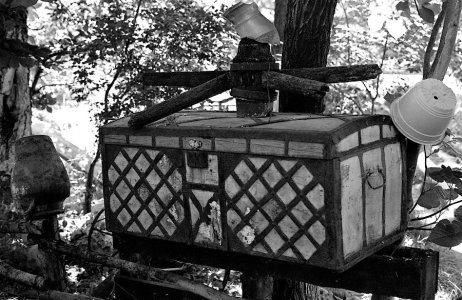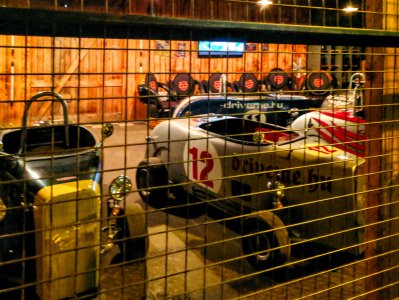Julian Tanase
Well-Known Member
Visited recently a small town in the Eastern Europe, in the Republic of Moldova. A small country, somewhere on a sliver of land between the Prut and the Dniester rivers, a country that currently struggles with the uncertainty of its future. Torn between the Soviet past and its reorientation to the European place it believes it deserves, this country is slowly waking up. There are a lot (a lot) of things that need to be addressed in order to get there, but they will succeed in the end, I believe. Good people, with less luck in their history. Perhaps times will change that.
This very small town I am speaking of is called Nisporeni. And in this town there is a small property, owned by a guy named Schultz, I guess this is his nickname. He owns and operates a small coffee and spirits bar on the premises, a small affair really, suited to this small town. Affable guy, business-driven, very personable and always ready to listen and making a conversation sparkle with interest, curiosity and local history knowledge.
He took it upon himself to make this place a bit different; he started years ago to collect junk, stuff people threw to the rubbish bins, and he repurposed the said junk to decorate his court yard. A few pieces he salvaged are really interesting, such as a very old horse cart, used in the past to transport goods and people in the rural areas, a carriage from the town’s children park, built by the Soviets in the 70’s and now long gone, a large old wooden box used to put the dowry of a peasant’s daughter when marrying, old wheels from horse carts, and so on.
He did this because he thought this “junk”, as others call it, is part of the local history, stuff they used in the past, a sort of heritage if you like. Everything is done by hand, by him alone, in a rather naïve manner; however, the heart and soul he puts in every corner of the court yard is more than making up for lack of whatever artistic criteria. It is actually an impressive effort to seek these pieces of old furniture, broken pots and pans, disparaged cart wheels and all of the bits he then reuses and combine and fashion into the stuff I have seen and enjoyed.
“People are not interested in this stuff anymore”, he says. “For instance, after the Soviet era, they threw away vintage furniture and everything that reminded them of the old days. They went and broke down entire sets of such vintage, hand-made furniture left from their parents or grandparents and burn them in stoves during the winter, or sold them for scraps. And they went to buy two-bit quality new ones, because it was fashionable to have the latest bed or closet or cupboard models. And they did this with an overwhelming desire to destroy everything related to their past. But getting rid of your past is not a solution, if you want to preserve your identity, he says.
A lot of this old stuff is gone forever, and among it were really old things, going back to the 18th and 19th centuries even. Now people realized their mistake and are looking to decorate their homes with such, but they are simply gone, they are ashes. And they did this for basically everything they had from the old days, even very old agricultural implements they inherited. A real loss for us, and a really sad thing to happen for the community’s past and history, which we all should protect and be proud of”.
Camera used to take these photographs was Olympus OM1, loaded with Agfa APX 100, Rodinal Spezial.

More photographs can be seen here. I hope you enjoy it.
This very small town I am speaking of is called Nisporeni. And in this town there is a small property, owned by a guy named Schultz, I guess this is his nickname. He owns and operates a small coffee and spirits bar on the premises, a small affair really, suited to this small town. Affable guy, business-driven, very personable and always ready to listen and making a conversation sparkle with interest, curiosity and local history knowledge.
He took it upon himself to make this place a bit different; he started years ago to collect junk, stuff people threw to the rubbish bins, and he repurposed the said junk to decorate his court yard. A few pieces he salvaged are really interesting, such as a very old horse cart, used in the past to transport goods and people in the rural areas, a carriage from the town’s children park, built by the Soviets in the 70’s and now long gone, a large old wooden box used to put the dowry of a peasant’s daughter when marrying, old wheels from horse carts, and so on.
He did this because he thought this “junk”, as others call it, is part of the local history, stuff they used in the past, a sort of heritage if you like. Everything is done by hand, by him alone, in a rather naïve manner; however, the heart and soul he puts in every corner of the court yard is more than making up for lack of whatever artistic criteria. It is actually an impressive effort to seek these pieces of old furniture, broken pots and pans, disparaged cart wheels and all of the bits he then reuses and combine and fashion into the stuff I have seen and enjoyed.
“People are not interested in this stuff anymore”, he says. “For instance, after the Soviet era, they threw away vintage furniture and everything that reminded them of the old days. They went and broke down entire sets of such vintage, hand-made furniture left from their parents or grandparents and burn them in stoves during the winter, or sold them for scraps. And they went to buy two-bit quality new ones, because it was fashionable to have the latest bed or closet or cupboard models. And they did this with an overwhelming desire to destroy everything related to their past. But getting rid of your past is not a solution, if you want to preserve your identity, he says.
A lot of this old stuff is gone forever, and among it were really old things, going back to the 18th and 19th centuries even. Now people realized their mistake and are looking to decorate their homes with such, but they are simply gone, they are ashes. And they did this for basically everything they had from the old days, even very old agricultural implements they inherited. A real loss for us, and a really sad thing to happen for the community’s past and history, which we all should protect and be proud of”.
Camera used to take these photographs was Olympus OM1, loaded with Agfa APX 100, Rodinal Spezial.

More photographs can be seen here. I hope you enjoy it.

